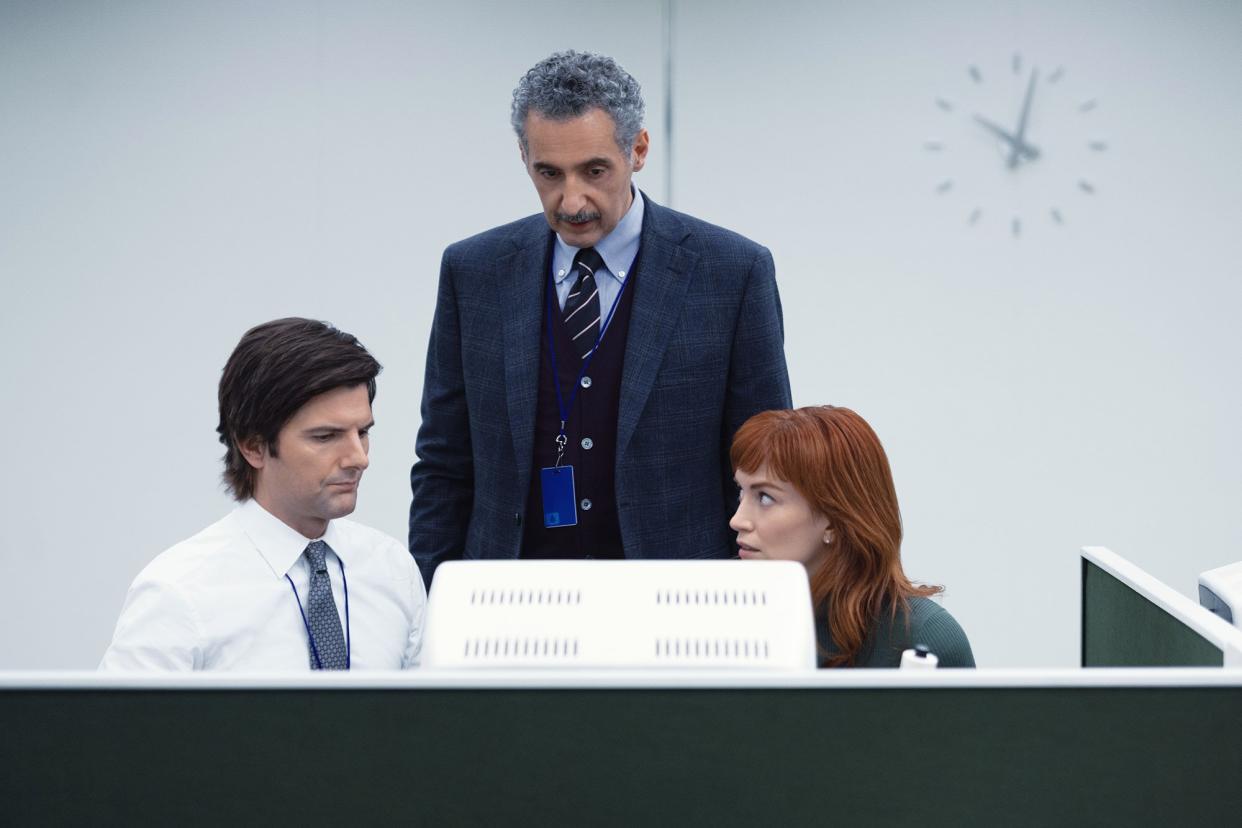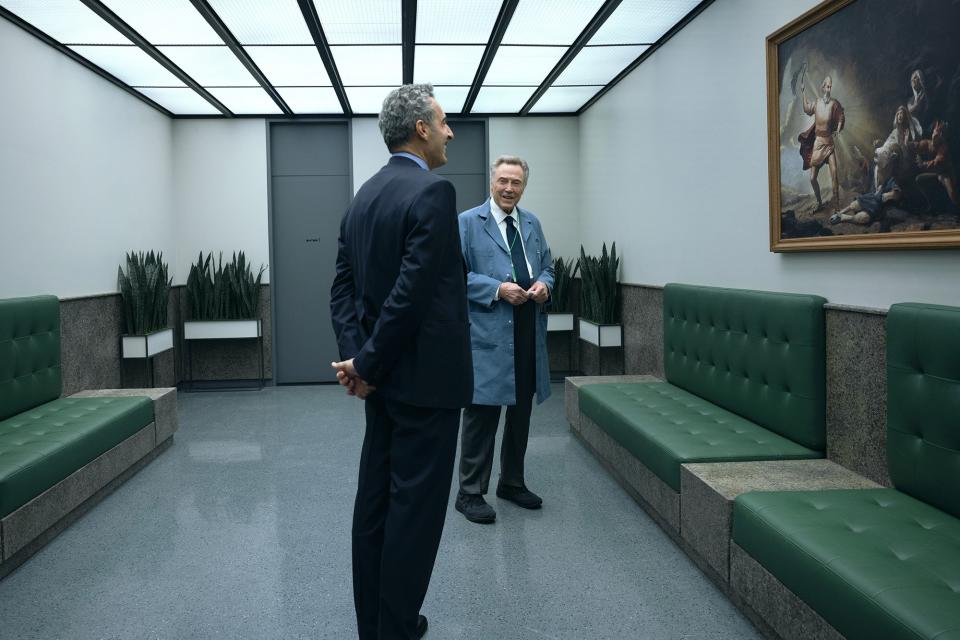Severance review: Adam Scott discovers that work is hell in wistful sci-fi thriller

- Oops!Something went wrong.Please try again later.
Apple TV + Adam Scott, John Turturro, and Britt Lower in Severance
Pain makes us human, which is probably why there is so much science fiction about the perils of trying to escape it. Who are we, after all, without our hurt? That question is at the core of Severance (Feb. 18 on Apple TV+), a sleek sci-fi psychodrama that slowly reveals its own beating heart under an extensively stylized exterior.
After losing his wife in a car accident, Mark Scout (Adam Scott) takes a job at a vague conglomerate called Lumon Industries. The company offers a procedure called "severance" — which surgically separates work-related memories from personal memories via a brain implant — and so every morning, Mark gets to clock in at Lumon and clock out of his grief until quitting time. Mark's work self (known as an "innie") has no knowledge of his life outside the office, while his home self (or "outtie") has no recollection of what goes on inside Lumon's walls. The company's innovation in mind management is highly controversial, but Mark's sister, Devon (Jen Tullock), and woo-woo brother-in-law, Ricken (Michael Chernus), do their best to tread lightly around him. "I just feel like forgetting about her for eight hours a day isn't the same thing as healing," says Devon gently.
For Mark, though, it's about survival. As soon as he steps off the elevator onto Lumon's subterranean "severed" floor, he's no longer a widower. He's "Mark S.," a chipper worker bee whose only family are his colleagues in the Macrodata Refinement department, including fussy company man Irving (John Turturro) and Dylan (Zach Cherry), who's just one quarterly target away from earning a coveted waffle party. But when their co-worker Petey (Yul Vázquez) goes missing, and his replacement — a freshly severed new hire named Helly (Britt Lower) — begins balking at the rigid rules of her Lumon-only existence, both Marks begin questioning whether his "innie" is as happy as he seems.
The first three episodes, directed by executive producer Ben Stiller, establish the show's chilly, anachronistic aesthetic, all geometric shapes and Midcentury modern sparsity. (Imagine Office Space by way of Stanley Kubrick.) Mark and his co-workers sort numbers on their conspicuously old-fashioned computers to earn chintzy incentives like Lumon-branded finger traps or a five-minute "music/dance experience." There are hints of something ominous: Mark's boss, Harmony Cobel (Patricia Arquette), uses withering silence as a weapon, and no one wants to spend any time in the ironically titled "break room." World-building is important, but Stiller's indulgent pacing gets Severance off to a dangerously slow start. When Mark first arrives at the office, for example, the camera follows him for a full 87 seconds as he walks through a labyrinth of narrow white hallways, like a mouse in a harsh fluorescent maze.

Wilson Webb/Apple TV + John Turturro and Christopher Walken in 'Severance'
There is substance under all that style, it just takes a while to get there. Severance is the brainchild of newcomer Dan Erickson, whose script first came to notice after landing on the BloodList (a showcase for unproduced genre screenplays) in 2016. As Mark's dual journeys progress, the episodes get tighter and tauter, and the tone broadens beyond aloof sci-fi into a captivating blend of religious horror and suspense thriller. Everyone at Lumon aims to "serve Kier" — that is, company founder Kier Eagan, who is depicted in a Baroque-style oil painting as an angel taming humanity's "four tempers": woe, frolic, dread, and malice. Irv is a true believer, quoting Kier's operations manual like Biblical verse. But an unexpected connection with a new Lumon acquaintance, Burt (Christopher Walken, shambolic perfection), prompts Irv to reconsider his corporate creator's sacred word. Mark's "innie," meanwhile, embraces his own holy book of sorts — one that his "outtie" probably wouldn't even bother to crack.
With his deadpan mien and dark eyes that shift fluidly between blank and befuddled, Scott is a superb fit for Severance's central everyman. Outside of Lumon, Mark is sardonic, reserved, and drink-himself-to-sleep depressed; at work, a gentle sadness thrums beneath his veneer of pleasant politeness. Lower brings an effective vulnerability to the acerbic Helly, and Tramell Tillman is an absolute force of charisma as Milchick, a deceptively genial Lumon supervisor.
Eventually, Severance's central mystery picks up a bracing momentum, and the story delivers cloak-and-dagger intrigue and artful weirdness (what's the deal with that room full of baby goats?) as Mark's parallel lives careen toward intersection. The final few installments yield urgently satisfying answers while leaving plenty of loose ends for a potential season 2. America's indelible myth of work/life balance will take more than nine episodes to bust. B+
Related content:

